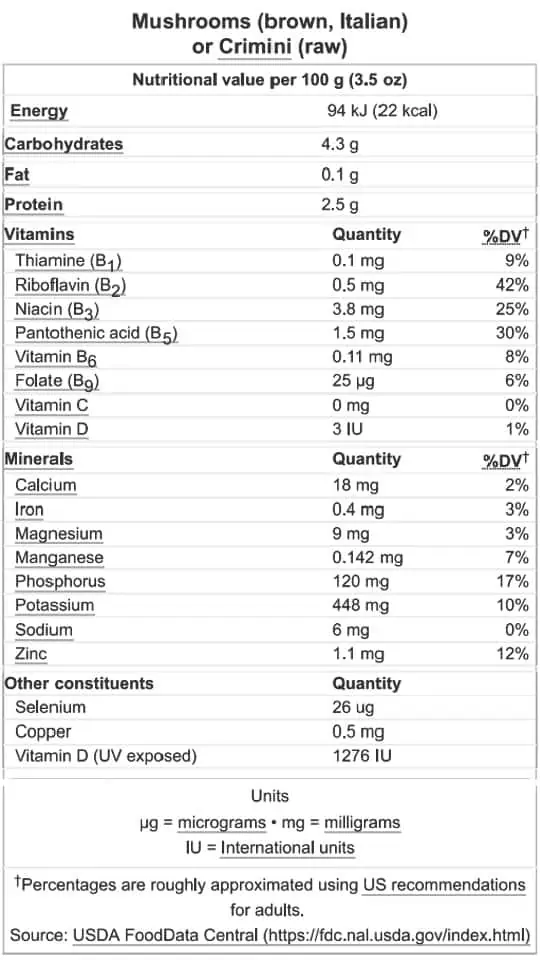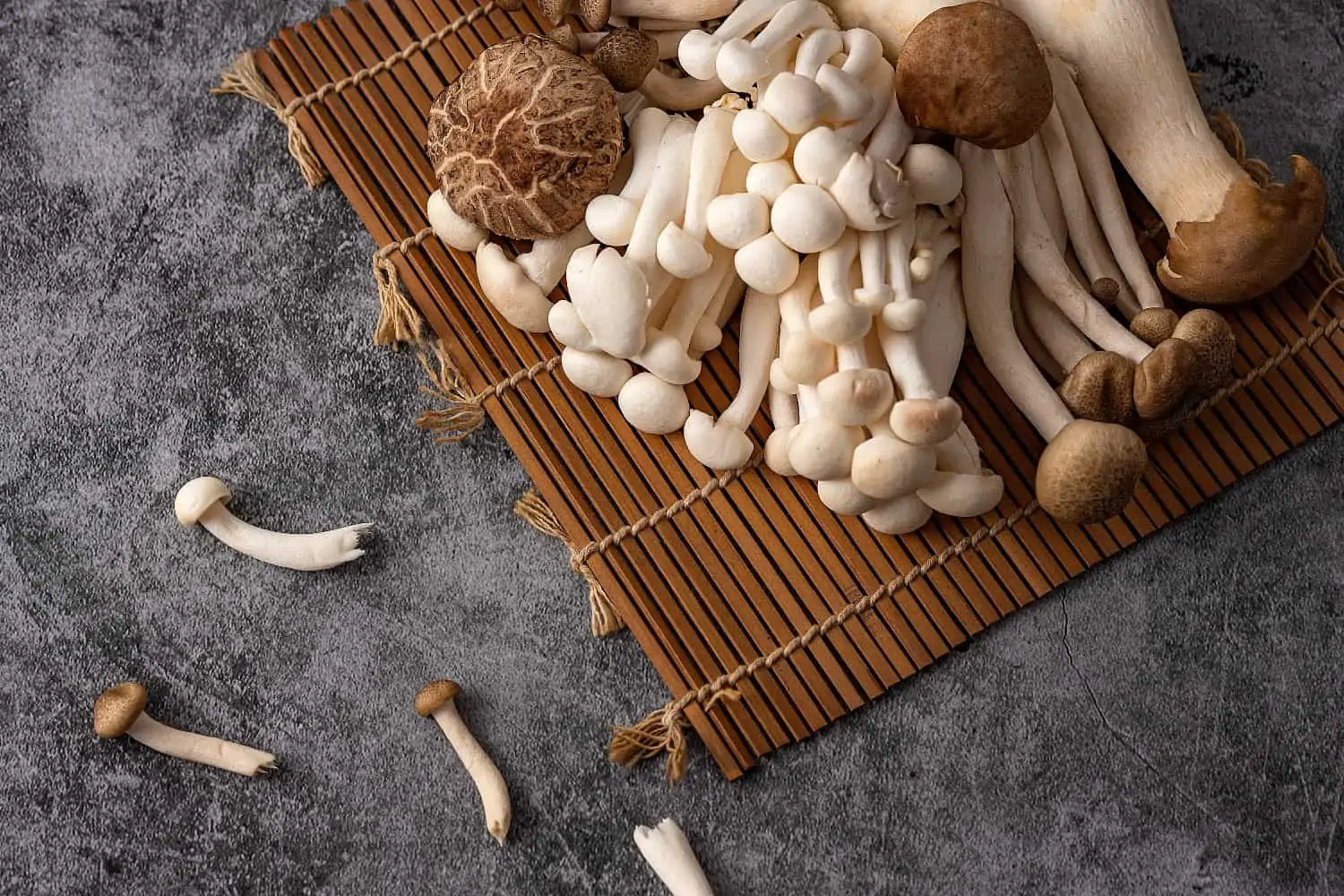Mushrooms are a truly phenomenal food source, they have an amazingly high nutritional value with almost zero downsides. High in both macronutrients and micronutrients while low in things like fat and cholesterol, mushrooms feed the body the vital nutrients it needs without forcing it to deal with possibly troublesome compounds.
Table of contents
What are Mushrooms?
Mushrooms are the flesh-like part of a fungus that bears the spoors, essentially having the same reproductive function as what most fruit has for plants.
There are over 10 000 known types of mushrooms, generally distinguished by a stem, fleshy rounded cap, and gills underneath the cap. Each species has a different nutritional value, while also having different appearances, textures and tastes. In fact, some mushrooms taste so different to one another that you would never believe they are from the same species. If you don’t believe me, try getting your hands on some pink oyster mushrooms, they taste and smell just like bacon!
At the same time, there is a wide selection of mushrooms that should not be eaten. Many of which are toxic to the human body and could result in illness or even death. Then there are also those which many refer to as magic mushrooms. These contain the psychoactive compound psilocybin, and while considered by some to be nothing more than a hallucinogenic drug, many scientists are currently doing studies into their medicinal value.
Taking this into account, it is important that while experimenting with any form of mushrooms you make sure they come from a reliable source and know what you are consuming.
Health Benefits of Mushrooms
Mushrooms have earned themselves the name Food Medicine and for good reason. Edible mushrooms offer a surprisingly wide variety of health benefits. Many of which come from various combinations of the nutrients within them. Plus, their value is even greater to human health due to their lack of unhealthy compounds, meaning there are few side effects and risks to their consumption. On top of this, many mushrooms also offer medicinal benefits. With their numerous non-nutritive substances, such as polysaccharides, indoles, phenolics, triterpenes and carotenoids. Which have proven to have antioxidant and anti-inflammatory effects among other things.
The Nutritional Value of Mushrooms
While there are many different types of mushrooms, most edible ones have similar nutritional content. Especially within a species. So, to a degree, we are able to generalise many of the nutritional values and benefits.
To start with, all varieties of mushrooms are low in calories and fat. While also low in sodium and cholesterol-free. Additionally, they contain incredible amounts of protein, along with various minerals and vitamins, and very importantly, a noteworthy percentage of fibre.

How They Benefit the Human Body
Gut Health
The benefits that mushrooms bring to our gut health are numerous and great. First off, they are a fabulous source of fibre. A nutrient that plays a vital role in many of the body’s functions and one that our digestive systems simply cannot do without.
Secondly, mushrooms come with a surplus of polysaccharides that act as a prebiotic. This means that they actually feed the good bacteria in our gut. Promoting the growth of growth and survival of beneficial strains like Lactobacillus and Bifidobacterium.
Heart Health
Again, the wonders of fibre come into play. Studies have shown that fibre may lower cholesterol, promoting cardiovascular health. To add to this, mushrooms are a great source of potassium, known to help regulate blood pressure, therefore decreasing the risk of hypertension and cardiovascular disease.
Then we also have to consider the vitamins that we get from mushrooms. Having healthy levels of vitamin C in the body has shown to reduce the risk of cardiovascular diseases. While some of the B vitamins such as niacin, riboflavin, and pantothenic acid also promote heart health. These along with copper, also promote the synthesis of red blood cells and improve the circulation of oxygen around the body.
Brain Health
Some of the greatest compounds that give mushrooms their high nutritional value are their B vitamins. Many of which have proven to play a major role in maintaining brain health. To add to this, the compound choline, which is found in mushrooms, can help with learning and memory, as well as overall muscle movement. It does this by assisting in maintaining the structure of cellular membranes while also playing a role in the transmission of nerve impulses. Plus, some studies have shown mushrooms may prevent the growth of the amyloid proteins related to dementia.
Healthy Bones and Teeth
The vitamin D from mushrooms is important in keeping our bones, teeth, and muscles healthy. Although it is good to know how your mushrooms are grown, because the methods used by some manufacturers may limit the amount of vitamin D in the mushroom.
Mushrooms also contain a moderate amount of phosphorus, which promotes the health of bones and teeth, while also contributing to kidney health. As well as this we get copper from mushrooms, which are another micronutrient that helps maintain healthy bones.
Muscles and Nerves
Of the nutrients beneficial to our muscle and nerve health, potassium is probably the most prominent. Potassium regulates your fluid balance, the muscle contractions in your body, and your nerves. Other nutrients that benefit our muscles and nervous systems are copper and the B vitamins niacin, riboflavin, and pantothenic acid.
Immuno-Boosting
Firstly we have to praise the wonders of antioxidants. These are compounds that control the levels of free radicals within the body. Protecting our cells from damage and helping prevent oxidative stress and the many problems it can lead to.
Next, we have a multitude of anti-inflammatory compounds to thank. These, such as the beta-glucan (which is actually a type of fibre), help control the body’s immune responses. Ensuring that no unnecessary and excessive inflammation takes place. This in turn helps prevent the many medical illnesses that can arise due to chronic inflammation.
Then we have to consider how connected our entire body is. Remembering things like the fact that 70% of our immune system is in our gut. This means that our gut health plays a vital role in the health of the immune system. So here again, fibre steps in. In fact, according to mycologist and fourth-generation herbalist Dr Christopher Hobbs, more fibre in our diets could help cut chronic illness by around 60 %. Yet the majority of humans do not consume enough fibre. Furthermore, having a healthy heart and well-functioning organs and muscular or nervous system will all play a role in improving your body’s general ability to cope with invaders.
Conclusion
The conclusion is simple. Mushrooms are fantastic, they have a high nutritional value with few downsides, and have been used in ancient and modern medicine. You just need to be sure of what mushroom you are consuming and trust your source.
